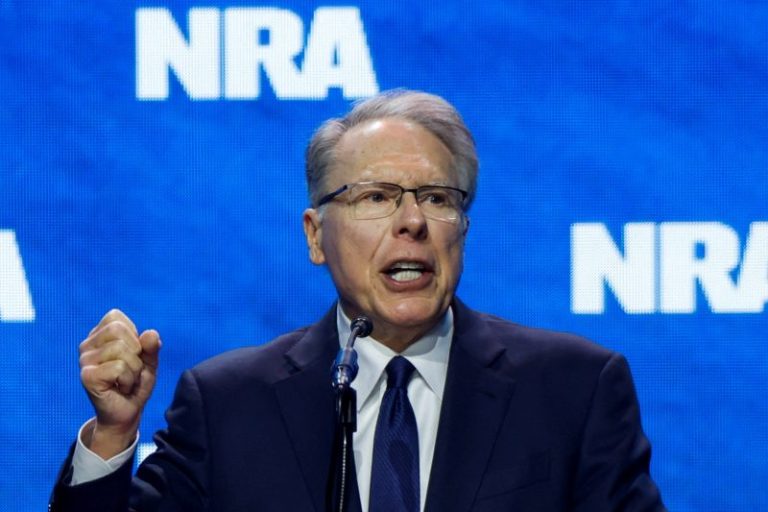NEW YORK — The New York State Attorney General’s civil corruption case against the National Rifle Association, its longtime leader Wayne LaPierre and other defendants centers on alleged mismanagement that cost the nonprofit organization millions of dollars.
The trial, which is scheduled for opening statements this week, includes allegations that resources were pilfered from the organization for personal use, such as buying expensive clothes and taking luxury trips, and that mismanagement involved nepotism and corrupt practices.
LaPierre, general counsel John Frazer, former treasurer Wilson Phillips and former chief of staff Joshua Powell have been accused of practices that undermined the organization’s charitable mission, which gives it special nonprofit status. On Friday, Powell settled with New York Attorney General Letitia James in an agreement that includes $100,000 in restitution and his testimony at the trial.
The NRA is based in Virginia but is incorporated in New York, dating to its post-Civil War founding in 1871. Its New York nonprofit status gives James’s Charities Bureau responsibility for regulatory oversight.
LaPierre announced Friday he was resigning as NRA chief executive, citing health reasons, after three decades in the post. His decision to step down effective at the end of January came as he faced the possibility of a court-ordered removal from the NRA.
Attorneys for LaPierre, Frazer and Phillips have denied wrongdoing. They did not respond to requests for comment after LaPierre’s decision to step down became public.
The case is expected to unfold in two phases. In the first phase, a six-member panel of jurors will decide whether there is cause to remove Frazer, the only remaining employee. The attorney general is seeking to bar the named individuals from serving on any board of a New York charity.
The jury in New York Supreme Court will also decide if monetary damages are warranted. A judge in the second phase will decide the details of Frazer’s removal if his ouster from the organization is justified, consider what damages to order and whether to mandate a monitor to oversee the NRA’s finances and spending.
LaPierre and other defendants could be ordered to pay millions back to the NRA, even though the nonprofit entity is also a defendant in the case. The organization is accused of enabling and permitting some of the alleged inappropriate conduct. The group’s net assets fell by $64 million from 2015 to 2018 because of its lack of accountability, according to a civil complaint.
“The NRA’s influence has been so powerful that the organization went unchecked for decades while top executives funneled millions into their own pockets,” James said in a statement when the lawsuit was filed in August 2020.“ “The NRA is fraught with fraud and abuse, which is why, today, we seek to dissolve the NRA, because no organization is above the law.”
The lawsuit alleges that LaPierre received lavish gifts from NRA vendors. It also says that for decades he secretly filtered questionable expenses through the NRA’s former public relations and advertising firm, Ackerman McQueen, to conceal the squandering of millions of the NRA’s money on luxury trips and other personal expenses that benefited LaPierre and his inner circle.
LaPierre, according to court filings, used more than half a million dollars in NRA funds to take his family to the Bahamas on a private jet at least eight times since 2015.
William Brewer, an attorney for the NRA, said in a phone interview that measures to address the misuse of funds and other issues were implemented by NRA officials several years ago after problems came to light.
Brewer said that when the NRA’s audit committee, an internal review team, learned of violations with certain contractors, it ended relationships with those that were not in compliance. Employees were similarly scrutinized, he said.
The organization is now “committed to best practices and is committed to making sure the NRA complies with not just its own policies but good sense,” Brewer said.
The attorney general sued for the dissolution of the NRA, but New York Supreme Court Justice Joel Cohen in March 2022 ruled against such a move. The allegations did not show that the NRA benefited from the misuse or that it was incapable of serving its membership, he said.
The NRA’s hard-line stance on gun rights in the United States in an era of prolific mass shootings has polarized many Americans, including after the 2012 Sandy Hook massacre of 20 first-grade students and six adults. LaPierre’s public response calling for more guns to protect schools drew fury from families involved in the tragedy and others.
The NRA’s alleged financial misappropriations have alienated some of its membership and has led to the rise of smaller pro-Second Amendment associations.
Nick Suplina, vice president of law and policy for Everytown for Gun Safety, a gun control nonprofit, said the NRA’s efficacy in lobbying the government for gun rights has diminished somewhat due to its publicly-reported infighting and its legal troubles, but that its legacy remains strong.
“In some ways the most effective part of the NRA is that it has infused its extremist ideology into a kind of mainstream culture-war debate that will survive even the organization,” Suplina said.

